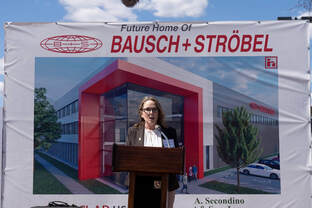SMALL
|
GROWING
JOBS

Branford is home to over two dozen bioscience companies. As a member of the BioScience Caucus we work closely with the industry to understand the challenges they face and how we can help with creating policies that support this growing industry. I supported the phasing out of the capital base tax and the biennial budget act which extends the angel investor tax credit program by five years, increasing the amount invested, and expanding the total amount of tax credits allowed to any angel investor. I am proud to support Connecticut's commitment to growing our capacity as a bioscience hub of activity. I have no doubts that Branford is poised to benefit from continued economic growth in this field.
Connecticut is also focused on the manufacturing sector. There are 40% more manufacturing jobs in CT today than before the pandemic with an additional 3,300 new jobs. The Office of Workforce Development, a division of the CT Dept. of Economic Development on the Governor's Workforce Council, has the vision that every Connecticut resident have access to a meaningful career pathway and the support needed to fulfill their aspirations and for every Connecticut business to have access to a skilled workforce. Their mission is to build the systems, teams, and approaches that will make Connecticut a talent environment that attracts and motivates students, career builders, and companies alike. Additionally, programs such as CTNext provides funding to help startups and early-stage businesses grow in our state.
This past session, I worked alongside my colleagues to pass a $46 billion dollar bipartisan budget which did not raise taxes, and focused on putting more money in the pockets of hard-working Connecticut families through increased tax credits. In this budget, I fought hard to fund our critical non-profits and health departments doing the yeoman's work during these challenging times.
Today, we have a $1.5 billion dollar surplus, our rainy day fund is at record levels at $3.5 billion dollars, and we continue to pay down our debt liabilities with a nearly $1 billion excess payment towards our pension debt for the first time in history. Our credit rating was upgraded for the first time in 20 years and we've had 3 consecutive surpluses allowing CT to make historic investments in municipalities. We are incredibly proud of the fiscal direction Connecticut is moving in right now.
This coming year, we have the rare opportunity to implement property tax cuts. We are lifting children and families out of poverty with the recently announced enhancement of the Earned Income Tax Credits. I support proposed investments for a child tax credit which will make Connecticut less expensive for our families. I made investing in non-profits a priority last year after tragically deep cuts that occured between 2008 and 2020. While I fought for the 4% increase they received, it's simply not enough, especially with the job market and inflation. Non-profits are experiencing high rates of job vacancies due to the inability to recruit with meaningful competitive pay combined with a 68% demand for services over the past two years. This amounts to a crisis for CT's community non-profits and for the most vulnerable in our state.
I would be remiss if I did not highlight the role that childcare has played in the disruption of our economy. There won’t be a full return to business as usual and an economic recovery without access to quality and affordable care as part of the solution. We have seen women leave the workforce in record numbers. While we look at our labor crisis we must understand how this has impacted Connecticut's business growth. States are losing hundreds of millions of dollars in economic activity due to childcare breakdowns. Removing barriers for parents and investing in childcare will need to be a focus of this state and I believe we can be leaders in this area. Businesses can be strong partners in this work.
Connecticut is also focused on the manufacturing sector. There are 40% more manufacturing jobs in CT today than before the pandemic with an additional 3,300 new jobs. The Office of Workforce Development, a division of the CT Dept. of Economic Development on the Governor's Workforce Council, has the vision that every Connecticut resident have access to a meaningful career pathway and the support needed to fulfill their aspirations and for every Connecticut business to have access to a skilled workforce. Their mission is to build the systems, teams, and approaches that will make Connecticut a talent environment that attracts and motivates students, career builders, and companies alike. Additionally, programs such as CTNext provides funding to help startups and early-stage businesses grow in our state.
This past session, I worked alongside my colleagues to pass a $46 billion dollar bipartisan budget which did not raise taxes, and focused on putting more money in the pockets of hard-working Connecticut families through increased tax credits. In this budget, I fought hard to fund our critical non-profits and health departments doing the yeoman's work during these challenging times.
- We increased the Earned Income Tax Credit from 23% to 30.5%.
- We have extended to the 2021 and 2022 tax years, the limits on eligibility for the property tax credit against the person income tax.
- We phased out the income tax on income from IRA's other than ROTH IRA's, for taxpayers with qualifying incomes, over a four year period starting with the 2023 tax year.
Today, we have a $1.5 billion dollar surplus, our rainy day fund is at record levels at $3.5 billion dollars, and we continue to pay down our debt liabilities with a nearly $1 billion excess payment towards our pension debt for the first time in history. Our credit rating was upgraded for the first time in 20 years and we've had 3 consecutive surpluses allowing CT to make historic investments in municipalities. We are incredibly proud of the fiscal direction Connecticut is moving in right now.
This coming year, we have the rare opportunity to implement property tax cuts. We are lifting children and families out of poverty with the recently announced enhancement of the Earned Income Tax Credits. I support proposed investments for a child tax credit which will make Connecticut less expensive for our families. I made investing in non-profits a priority last year after tragically deep cuts that occured between 2008 and 2020. While I fought for the 4% increase they received, it's simply not enough, especially with the job market and inflation. Non-profits are experiencing high rates of job vacancies due to the inability to recruit with meaningful competitive pay combined with a 68% demand for services over the past two years. This amounts to a crisis for CT's community non-profits and for the most vulnerable in our state.
I would be remiss if I did not highlight the role that childcare has played in the disruption of our economy. There won’t be a full return to business as usual and an economic recovery without access to quality and affordable care as part of the solution. We have seen women leave the workforce in record numbers. While we look at our labor crisis we must understand how this has impacted Connecticut's business growth. States are losing hundreds of millions of dollars in economic activity due to childcare breakdowns. Removing barriers for parents and investing in childcare will need to be a focus of this state and I believe we can be leaders in this area. Businesses can be strong partners in this work.

